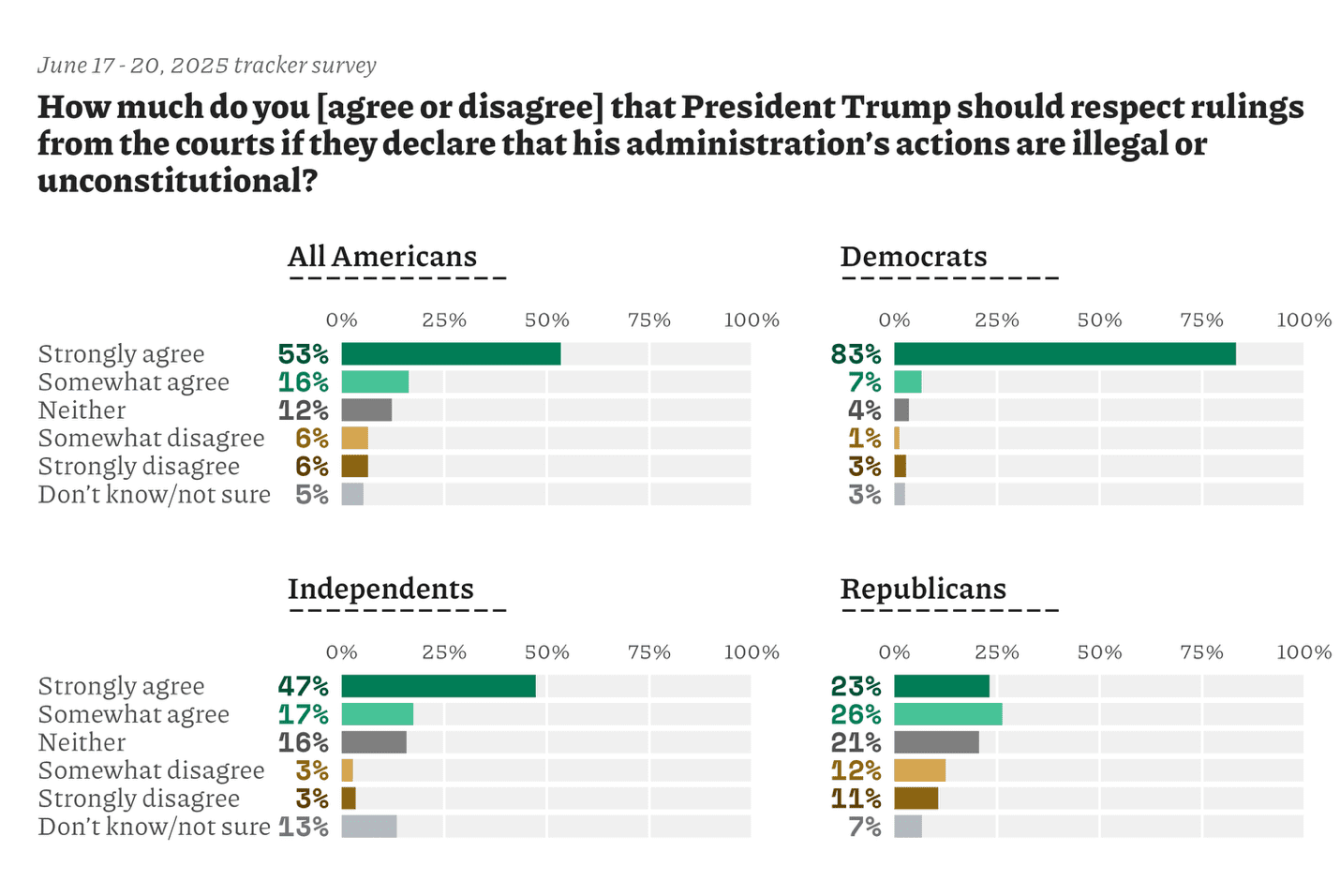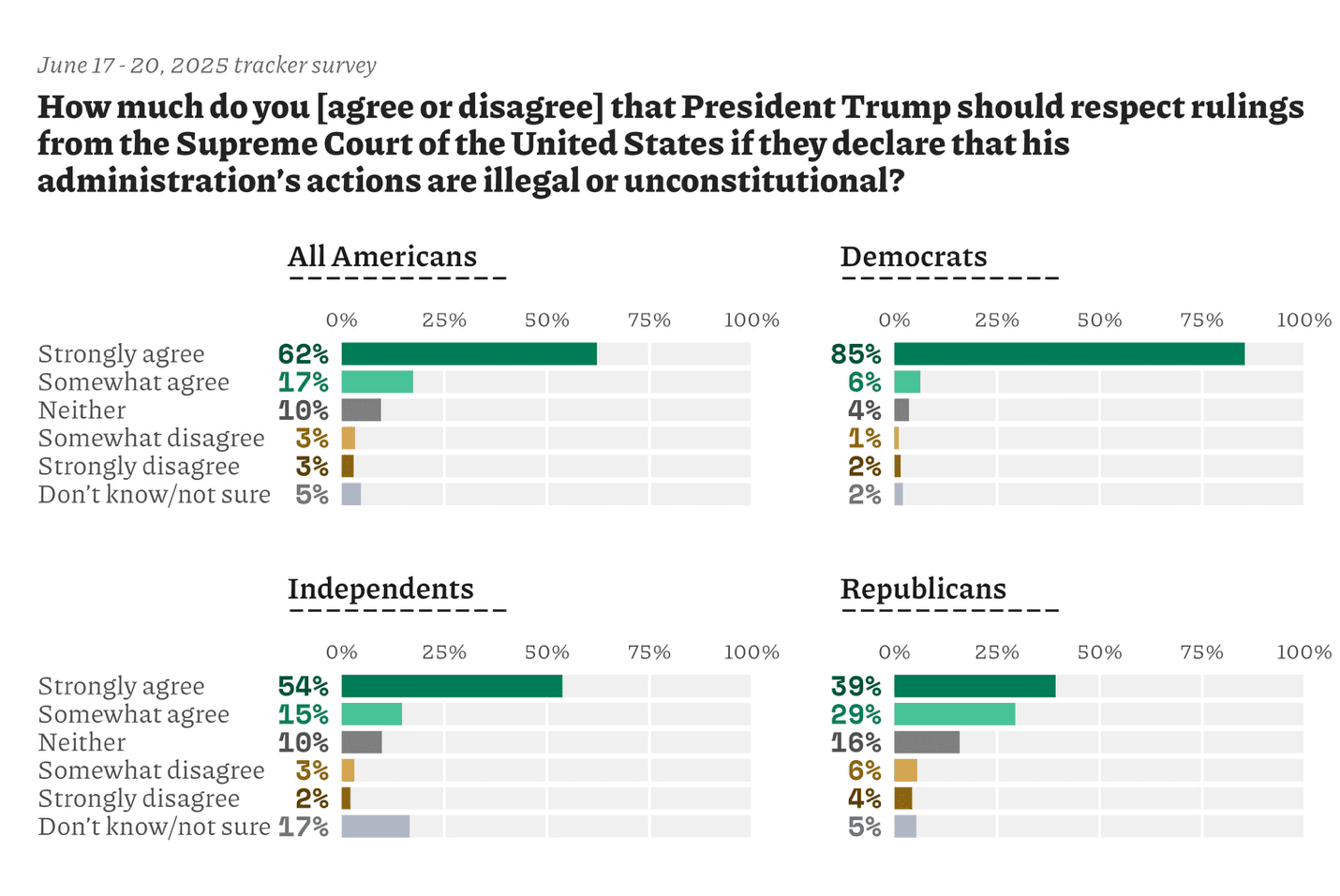Americans Continue to Agree: The President Should Respect Court Orders
In This Resource
Frustrated by a series of court decisions that found its actions were unconstitutional, the Trump administration has repeatedly ignored judicial orders, evaded contempt proceedings, and sued judges with whom it has disagreed. Americans continue to disapprove of these actions.
Recent polling from States United and YouGov shows that a substantial majority of Americans believe President Trump should respect rulings from courts, including the U.S. Supreme Court.
The survey results cross party lines, showing overwhelming support among Democratic and independent voters and strong support among Republicans.
Even as the president has disregarded courts, Americans have not wavered in their opinion that it is not acceptable. These latest results are consistent with previous States United polling from February. That survey showed that most Americans believe the president should follow court rulings, including when they declare his actions unconstitutional.
In July, The Washington Post reported that the Trump administration had defied a third of the judges who ruled against the president’s actions. The Post analyzed 160 lawsuits when judges issued a “substantive ruling,” and found a widespread trend of ignoring rulings, providing false information, and failing to hand over evidence, among other actions.
Supreme Court Justice Sonia Sotomayor has even called out the administration’s judicial evasion, writing in a June dissent that the administration has “openly flouted” court orders.
At the same time, the administration has sued every federal judge in one state, and attempted to block contempt proceedings from a judge in a different state after he tried to force administration officials to comply with his orders. The administration’s actions have raised concerns about the erosion of the constitutional principle of checks and balances.
States United partnered with YouGov on a national survey of 1,515 adults between June 17 and 20 to better understand Americans’ views on this issue.
- Most Americans agree that Trump should respect court rulings, even when they rule against him. Levels of disagreement are low, including among Republicans.
- Even more Americans believe Trump should respect rulings from the U.S. Supreme Court. Most Democrats, independents, and Republicans agree.
About 7 out of 10 Americans express some level of agreement that Trump should respect rulings from the courts if they declare that his administration’s actions are illegal or unconstitutional; a majority (53%) strongly agree with this. About 9 out of 10 Democrats agree that Trump should respect court rulings, as do nearly two-thirds (65%) of independents. Nearly half of Republicans (49%) also agree the Trump administration should respect these decisions. Though, disagreement among Republicans (23%) is higher than any partisan group.

States United and YouGov also asked people whether they agreed that Trump should respect U.S. Supreme Court rulings. Nearly 8 in 10 Americans say that they somewhat or strongly agree that Trump should do so, and 62% say that they strongly agree. This is higher than when respondents are asked about courts in general terms. Among those surveyed, 92% of Democrats, 68% of independents, and 69% of Republicans express some level of agreement that the president should respect Supreme Court rulings. Republicans in particular seem to be more open to agreeing that Trump should comply with the Supreme Court than they are when it comes to courts generally. This pattern is consistent with prior polling.

Survey results are taken from a States United survey based on 1,515 interviews conducted on the internet of U.S. adults. Participants were drawn from YouGov’s online panel and were interviewed from June 17 – 20, 2025. Respondents were selected to be representative of American adults. Responses were additionally weighted to match population characteristics with respect to gender, age, race/ethnicity, education of registered voters, and U.S. Census region based on voter registration lists, the U.S. Census American Community Survey, and the U.S. Census Current Population Survey, as well as 2020 presidential vote. The margin of error for this survey is approximately ± 2.7 percentage points, though it is larger for the analysis of partisan subgroups described above. Therefore, sample estimates should differ from their expected value by less than the margin of error in 95% of all samples. This figure does not reflect non-sampling errors, including potential selection bias in panel participation or measurement error.
In keeping with best research practices, we classify independent voters who reported “leaning” toward either the Democratic or Republican parties as partisans. Therefore, “independents” are defined as those respondents who professed no partisan attachments whatsoever.